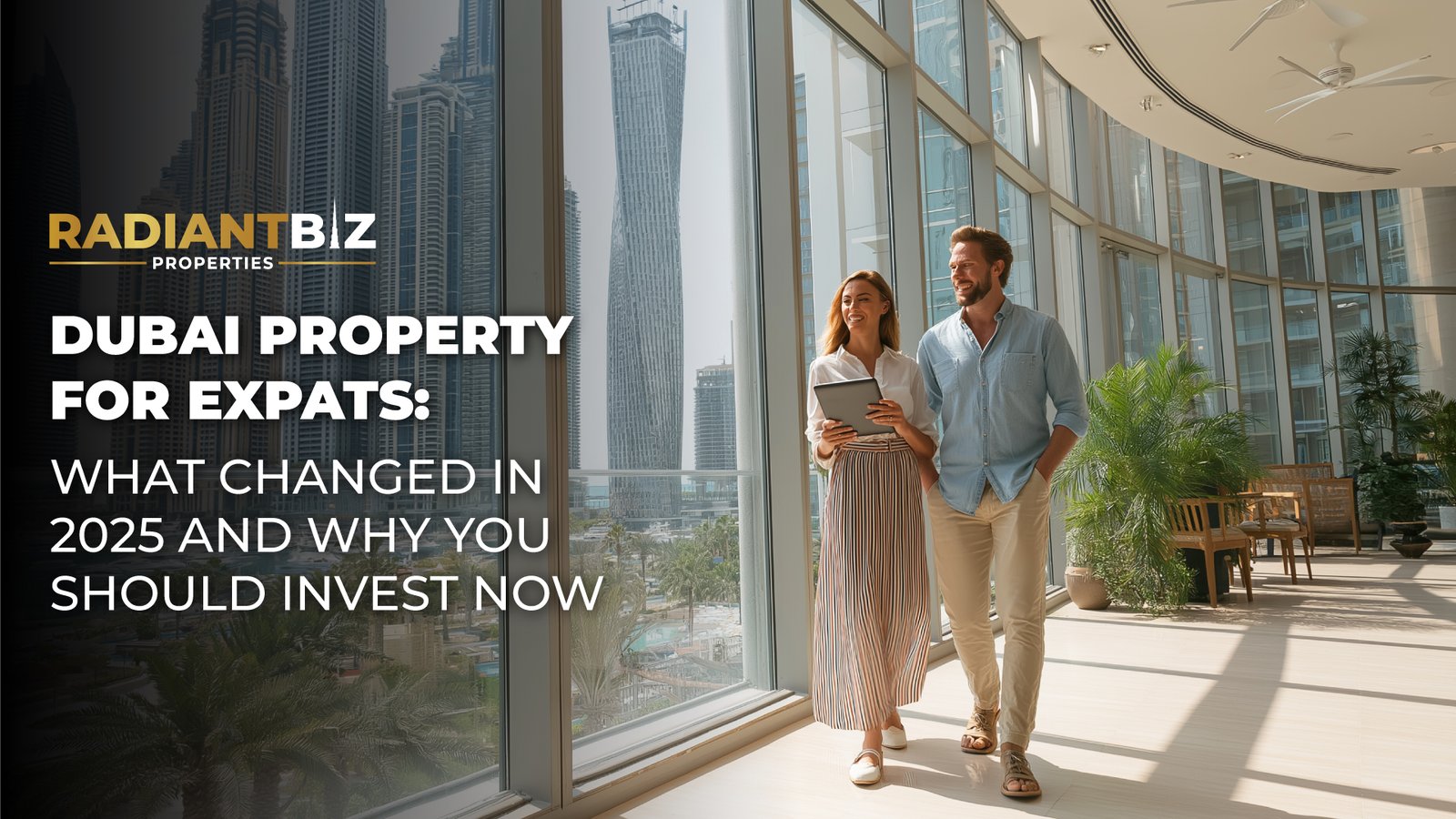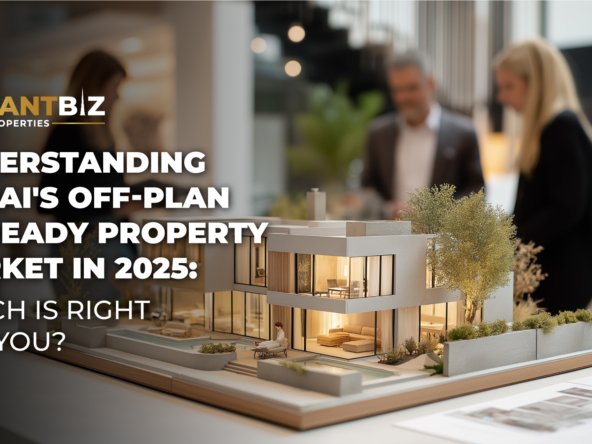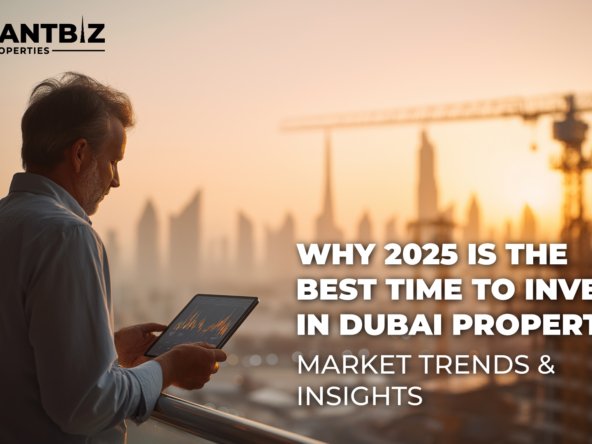Dubai has been a massive magnet for expat property buyers as a result of its strategic placement, business environment, and its striking skyline. Foreign buyers have flooded the city for decades with the promise of secure, lucrative real estate transactions accompanied by a vibrant lifestyle.
But 2025 is a pivotal year for expats looking to invest in property in Dubai, as a series of regulatory updates and shifting market conditions present an optimal moment to buy.
If you’ve been waiting for the ideal moment to get your foot in the door of Dubai’s real estate market, this post breaks down what changed in 2025, the most prevalent trends affecting the market, and why moving now could give you a top-notch long-term yield.
A Quick Look Back: How Dubai’s Property Market Has Changed for Expats
Dubai’s openness to foreign property ownership dates back to 2002 when the government introduced freehold ownership laws for select areas. This moves transformed Dubai into one of the world’s most accessible property markets for international buyers.
Since then, areas like Dubai Marina, Downtown Dubai, Jumeirah Lakes Towers, and Palm Jumeirah have flourished as premier freehold zones where expats could own property outright, with full rights to buy, sell, or lease.
Over the past two decades, Dubai’s real estate market has matured significantly. Developers began offering off-plan properties with flexible payment plans, allowing investors to enter the market with smaller initial outlays.
The Expo 2020 event, delayed until late 2021 due to the pandemic, injected new life into the market, attracting global attention and driving demand for both residential and commercial properties.
Between 2020 and 2024, Dubai’s property market steadily recovered from the global slowdown, setting the stage for major changes in 2025.
What Changed in 2025? Key Legal & Regulatory Shifts
The year 2025 brought several important regulatory updates that directly impact expat investors and their ability to benefit from Dubai’s property market.
- Unified Investor Residency Program
One of the most talked-about changes is the introduction of a unified investor residency program. Previously, property ownership had to meet a certain threshold (typically AED 1 million or more) before the investor would qualify for long-term residency visas.
In 2025, the thresholds were amended and streamlined so that the process became easier and more automatic. Today, property investors who meet the minimum may be able to obtain Golden or 10-year investor visas with residency rights attached directly to property ownership.
This move aligns with Dubai’s broader goal of attracting global talent and capital, especially in a competitive post-pandemic world.
- Expansion of Freehold Areas
Dubai continues to add new freehold areas for expats, widening options beyond the classic hotspots.
In 2025, additional zones such as areas of Mohammed Bin Rashid City (MBR City) and Jebel Ali Free Zone were formally opened up for foreign purchase. Such additions increase supply and offer investors opportunities at high-potential new developments with competing prices and better infrastructure.
- Introduction of Property Crowdfunding and REIT Investment for Expats
A new regulatory framework allows expats to participate in fractional ownership models such as property crowdfunding and Real Estate Investment Trusts (REITs).
This is a game-changer for investors who want exposure to Dubai’s real estate market without the need to buy whole properties. The Dubai Land Department’s updated policies have brought clarity and security to these alternative investment vehicles, encouraging more expats to diversify their portfolios.
- Title Deed Digitization and Smart Contracts
The government of Dubai has adopted blockchain technology to facilitate easy property transactions. The use of digital title deeds and smart contracts has significantly minimized paperwork and transaction time.
For expats who usually invest overseas, this translates to easier, quicker, and more transparent property application and transfer of ownership.
2025 Market Trends: What the Data Shows
The regulatory changes have also come at the same time as some dramatic market trends in 2025:
Upward Trends in Expat Investment: There has been a significant surge in expat buying, especially from UK-based, Indian, Chinese, and European investors.
Easier residency channels combined with increased confidence in the economy of Dubai are fueling interest.
Off-Plan Sales Boom: Developers reportedly have boosted off-plan sales with good payment terms and the assurance of new freehold plots.
Rental Yield Growth: Several residential neighborhoods popular among expatriates have seen rental yields increase 5-7% year-on-year, making rental income an appealing option.
Price Appreciation: Prime areas like Downtown Dubai, Business Bay, and new communities like Dubai South have seen stable price appreciation, with the average price per square foot rising by 8-10% compared to 2024.
New Launches: Prestigious new launches by prominent developers, especially in MBR City and Dubai Creek Harbour, are being launched with state-of-the-art amenities and high capital appreciation.
Top Areas to Invest in 2025
If you’re considering property investment as an expat in 2025, here are some of the top communities worth your attention:
Dubai South
Located near the upcoming Al Maktoum International Airport, Dubai South is a strategic choice with massive growth potential. The area benefits from excellent connectivity, proximity to Expo 2020 legacy sites, and government-backed development plans aimed at creating a mixed-use city with residential, commercial, and logistics hubs.
Mohammed Bin Rashid City (MBR City)
MBR City’s growth as a freehold community in 2025 offers investors a play on luxury villas, apartments, and townhouses with elite facilities. Already, it is emerging as a high-end buyer hotspot with dreams of high capital appreciation and best-of-class community amenities.
Jumeirah Village Circle (JVC)
With cash-strapped investors on the lookout for cheap high-demand rental properties, JVC remains attractive. It is an existing community with relatively lower costs and hefty rental yields, making it a suitable one for first-timers or investors seeking steady rental income.
Palm Jebel Ali
Dubai’s iconic man-made islands are expanding with the launch of Palm Jebel Ali, a new luxury destination aimed at high-net-worth individuals. This is an exciting opportunity for investors looking for exclusivity and premium property value appreciation.
Downtown Dubai and Business Bay
These proven territories remain the best bets for capital growth and rental demand. They present high-end apartments and penthouses within easy reach of key landmarks, business hubs, and entertainment precincts, thus ensuring them as evergreen choices for expats.
Why Expats Should Invest Now: 2025’s Unique Opportunity
The mix of regulatory reforms, market momentum, and economic strength of Dubai makes 2025 an unprecedented year for expat real estate investors.
Long-Term Residency and Security
These new reforms in residency visas also mean that ownership of property no longer merely offers cash dividends, but stability and security in the long run in Dubai. Investors who are golden or 10-year visa-qualifying enjoy the guarantee of residency rights that frees them from worry regarding the care of their properties and settlement.
High Rental Yields Amid Demand Spikes
Dubai’s expat population is increasing due to visa reforms, favorable job market conditions, and the city’s evolving lifestyle appeal. This surge has led to growing demand for rental properties, pushing yields higher. Investors can expect steady income streams alongside capital gains.
Favorable Exchange Rates for Key Markets
2025 currency trends have favored significant expat source markets like the UK, India, and parts of Europe. Stronger home currencies vis-a-vis the AED mean expats can get a better deal when they invest in Dubai, reducing entry points and maximizing returns.
Nice Developer Deals
In response to competitive market conditions, many developers have introduced enticing offers such as flexible payment plans requiring as little as 1% monthly installments, post-handover payment schemes, and waived registration fees. These incentives reduce upfront capital requirements and improve cash flow for investors.
Dubai’s Economic Confidence
Dubai’s economy is projected to grow robustly in 2025, supported by booming tourism, international trade, and infrastructure projects. The city’s zero income tax policy, safe political environment, and state-of-the-art infrastructure make it an evergreen investment destination.
What Should Expats Watch Out For?
While 2025 offers many exciting prospects, it is important to stay cautious and informed:
Developer Due Diligence: Always make sure to deal with RERA-certified developers to avoid risks of project delays or legal issues.
Exit Strategy for Off-Plan Investment: Off-plan properties are subject to construction and market risk. Strategize an exit in case you have to sell before handover.
Service Charges and Maintenance Fees: Make yourself aware of the periodic cost of property ownership, which varies by community and property type.
Legal Support: Employ approved brokers or legal advisors, especially for distant investment, to ensure that all records and contracts are valid.
Compliance & Legal Standards for Expats
Investing in Dubai property as an expat entail fulfilling certain compliance protocols:
Documents: You’ll typically need a copy of a valid passport, Emirates ID (if relevant), proof of funds, and potentially a no-objection certificate depending on your residency status.
Power of Attorney: Non-resident investors can appoint a reliable representative by power of attorney to perform property transactions.
Fees: Property registration fees are charged by the Dubai Land Department, typically 4% of the property value, with a nominal admin fee on top.
Mortgage Access: Expats can obtain mortgages in Dubai, with LTV ratios often between 50-75%, depending on the property and investor profile.
How to Start the Investing Process: Step-by-Step for Expats
- Set Your Budget and Investment Goals: Determine whether to buy for occupation, rental return, or capital appreciation.
- Determine Ready or Off-Plan Properties: Ready offers immediate return but often at a higher price, while off-plan offers more value and terms of payment.
- Select Suitable Locations: Optimize lifestyle requirements, ROI, and visa benefits that come with property locations.
- Hire a Licensed Agent or Consultant: Engage a RERA-certified professional to advise you on the market and paperwork.
- Secure Financing: If you require a mortgage, consult with banks or brokers for pre-approval.
- Reserve Your Property: Once you identify the perfect unit, sign the booking and reservation documents.
- Final and Residency Application: Sign up the property with DLD and make applications for relevant residency visas.
Final Thoughts: The Time is Now
2025 is a breakpoint in Dubai real estate for the expat. The changes in regulation have streamlined ownership, linked property investment to long-term stay, and thrown open doors to promising new fronts. With favorable market conditions, rental demand, and developer incentive, the expat investor has never been better positioned.
Waiting could mean missing out on price appreciation, limited visa slots, and growing competition. If you’ve been contemplating entering Dubai’s property market, now is the time to act—secure your slice of this dynamic, cosmopolitan city’s growth story.
If you’re ready to take the next step or want expert advice on navigating Dubai’s property market in 2025, reach out to licensed property consultants who specialize in assisting expat investors. Your Dubai property journey starts here—and the future looks bright.
Seek our professional on-the-ground guidance, contact us via mail at info@radiantbiz.com or WhatsApp & call us at +971 55 234 7124!




